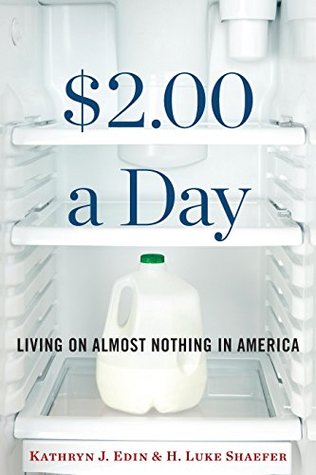More on this book
Community
Kindle Notes & Highlights
Read between
March 23 - April 9, 2018
Take Susan Brown in Chicago’s Roseland community, about twenty miles south of the shelter where Modonna and Brianna are living. Asked if she plans to apply for welfare, Susan recoils a bit, shaking her head emphatically, as if to say, Of course not. When pressed to explain her reluctance, she explains, “I just don’t want to get rejected again.” Every time she gets turned down by a prospective employer, she cries uncontrollably. Why open herself up to certain failure by applying for welfare?
Through “man in the house” rules, state caseworkers had engaged in midnight raids to ensure that recipients had no adult males living in the home. In addition, “suitable home” requirements had enabled caseworkers to exclude applicants if a home visit revealed “disorder.” Some instituted “white glove tests” to ensure “good housekeeping.” An applicant could be denied if the caseworker’s white glove revealed dust on a windowsill or the fireplace mantel.
According to this narrative, supporting unwed mothers with public dollars made them more likely to trade in a husband for the dole.
Pretty nuts that they put mens’ value so low that women were assumed to trade in “free money” for a man...and yet don’t question men’s inherent value or lack thereof. Of course it’s misogyny
What is known, though, is that the way things turned out, the 1996 reformers didn’t merely “replace” welfare. They killed it. By 2012, welfare was far from the minds of the $2-a-day poor. So far, in fact, that Modonna Harris, living in a shelter on the Near West Side of Chicago, and Susan Brown, living in the dilapidated family home on the South Side—both eligible for the program—thought they just weren’t giving it out anymore.
Yet Jennifer’s devotion to work has not been enough to shield her family from multiple spells of life on less than $2 a day. Cashier, sandwich maker, waitress, laundress, general laborer, custodian—these are all occupations Jennifer has held. And she’s been judged a good worker in many of these jobs, offered small promotions, given the occasional extra shift as a reward.
The extreme of this phenomenon is the growing prevalence of “on-call” shifts. In recent years, many service sector employers have begun requiring workers to be available on certain days and at certain times even when they aren’t working. They might be expected to call in (or even show up) each day and, if a supervisor demands it, report to work in short order. If they are not needed, they get no compensation for the time spent on call.
When she and Devin went in for her first ultrasound, she remembers, “I could tell by the way the doctor was acting that something was wrong, but she wouldn’t tell me.” After seeking answers at three different clinics, a doctor finally told her that the baby had a major developmental defect. At eight months, Susan delivered a stillborn child.
of what researchers refer to as “toxic stress,” defined as “strong, frequent, or prolonged activation of the body’s stress response systems in the absence of the buffering protection of a supportive, adult relationship.” She is on near-constant high alert—never knowing when a new threat may emerge or an old one may reappear. And she is always dealing with crisis in one form or another. Exposure to toxic stress affects people mentally and even physically.
My children] didn’t go out [of the house for school] . . . ,” Paul says. “They’re not full of the world. They love the Lord. They might not be doing the best, [but] I don’t care if they’re doctors and lawyers, as long as they love the Lord.”
“Probably with the condition it’s in, it’s worth fifteen thousand,” he says. “I’m stuck with a sixty-five-thousand-dollar mortgage on a fifteen-thousand-dollar house.”
No he isn’t?? He’s stuck with a 65k mortgage on a 70k home that he bet on and didn’t pay off. This mentality of him being owed something is..something. Maybe don't bet the house on your failing pizza business. Male ego is something.
One week he found a thousand-dollar check inside. But of equal importance, he says, “the Lord allowed three accidents on my 2004 [Dodge] Caravan [that were the fault of the other guy]. I got fifteen hundred [for] one side, then twelve hundred on the next side, . . . a thousand on the next . . . I’d say, ‘Lord, you got one more side, the driver’s side!’”
employment, and she moved in along with her kids. One of his son’s ex-wives—with kids from several previous relationships—lost custody of all six of her children when she was hospitalized with terminal cancer. When child welfare came calling, Paul and Sarah took them in, too. Then their son Sam’s wife deserted him, leaving him with six young kids to care for, including three from her previous marriage.
WHY DO THEY HAVE SIX KIDS EACH WHAT THE FUCK. And why are they writing this like it's her fault she got cancer and not at all emphasizing "ONE OF HIS EX WIVES" like stop marrying women and knocking them up, my dude.
At one end is a pink-and-green children’s picnic table complete with benches, which adds seating for an additional four. “I like it because when they spill their milk, you just hose down the driveway. Like five of ’em generally spill their milk in a meal.” This strategy has a downside, however. “Somehow, we are a magnet for rats . . . Rats come from all over the neighborhood. They come out and sit right on the table . . . I take my pellet gun, [and] we have fun using the rats for target practice out of my bedroom window!”


